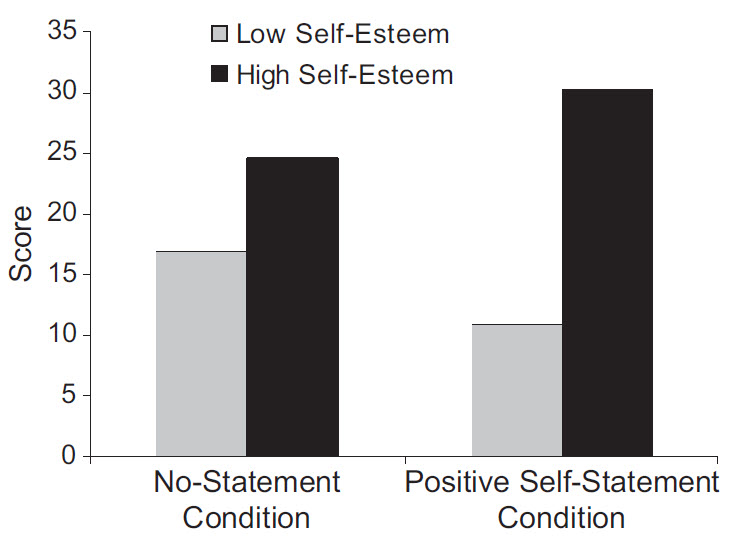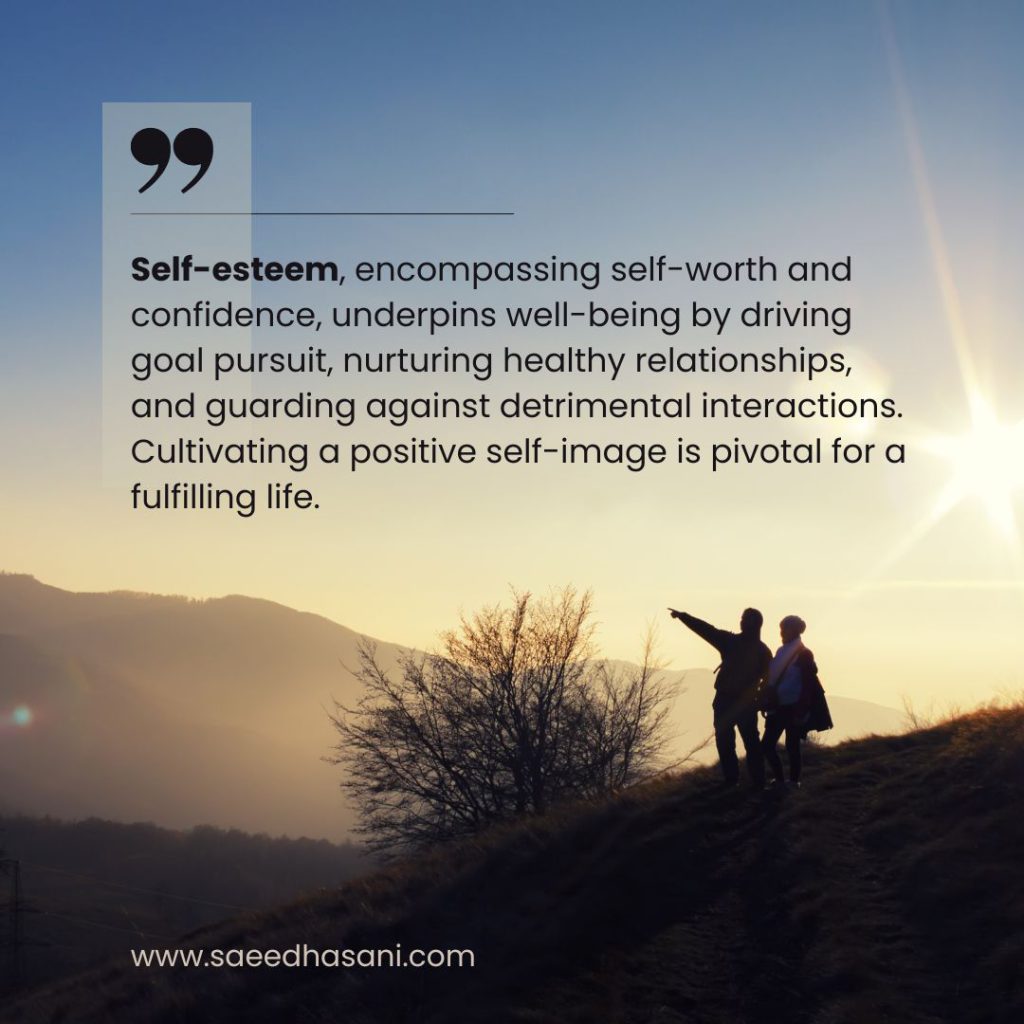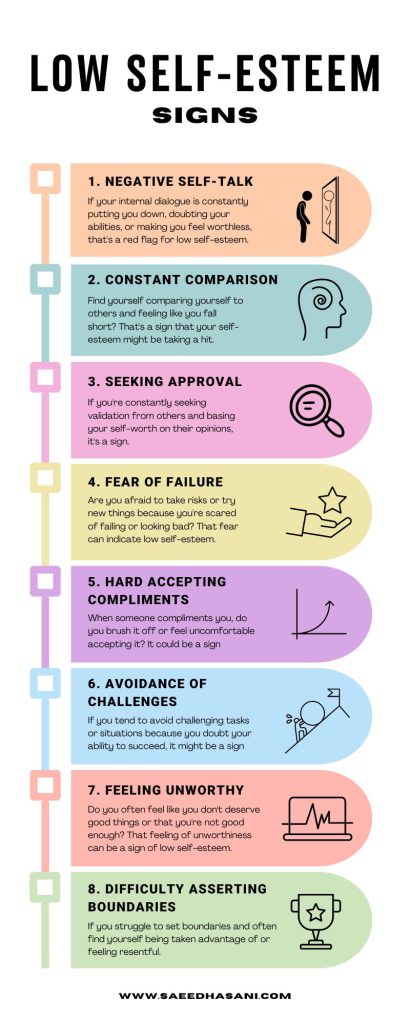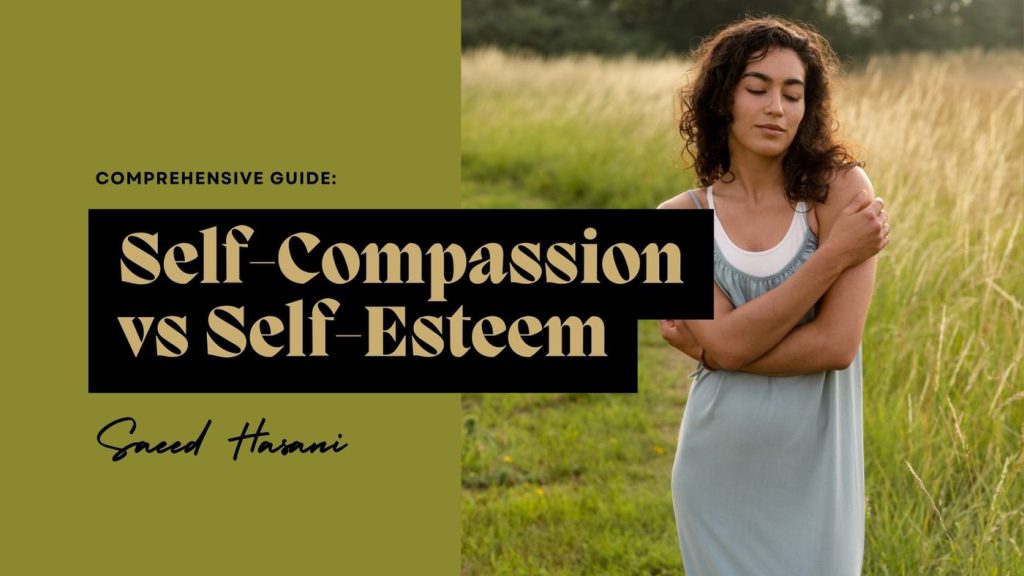Self-Esteem: Comprehensive Guide from Doubt to Belief + 10 Factors that Affect it!

Feeling a bit uncertain about your self-esteem lately? Don’t worry; we’ve got you covered! In our latest blog post, “From Doubt to Belief: Embracing the Impact of Self-Esteem,” we’ll dive deep into the world of self-esteem and explore why it’s essential for your well-being.
Self-esteem, that subjective evaluation of your worth and confidence, can have a profound effect on your life. We’ll show you how it influences your motivation, goal pursuit, and even your relationships. From building healthy connections to avoiding toxic ones, self-esteem is a game-changer.
And if you’ve been wondering whether your self-esteem can affect your relationships, you won’t want to miss this. We’ll explore how our beliefs and perceptions about ourselves and others can shape our self-esteem and, in turn, impact our connections with others.
Content Overview:
What is Self-Esteem?
Self-esteem is basically how you feel about yourself—it’s your overall opinion of your worth and value. Imagine it as the internal dialogue that tells you how good, capable, and important you are. When you have high self-esteem, you tend to feel confident, optimistic, and capable of handling life’s challenges.
On the flip side, low self-esteem can make you feel doubtful, critical of yourself, and less likely to take on new tasks or challenges.
Think of it like a mental mirror. If you have a positive self-image, you’ll likely see yourself as competent and worthy of respect. If the mirror’s reflection is negative, you might struggle with feelings of inadequacy and self-doubt.
Self-esteem can be influenced by many factors, including your upbringing, experiences, relationships, and even societal standards.
Building self-esteem often involves recognizing your strengths, celebrating your achievements, and practicing self-compassion. It’s like being your own best friend, cheering yourself on instead of tearing yourself down.
And just like any relationship, the one you have with yourself requires care and attention to grow positively.

What is Excessive Self-Esteem?
Excessive self-esteem, often referred to as overconfidence or narcissism, is when someone has an inflated view of their own worth and abilities.
It’s like looking in a funhouse mirror that makes you appear bigger and better than you really are. While healthy self-esteem is grounded in reality, excessive self-esteem ignores any flaws or limitations, often leading to unrealistic expectations and behaviors.
Imagine someone who always believes they are right, no matter the situation. They might dismiss feedback, thinking they know better than everyone else. This kind of attitude can strain relationships because people with excessive self-esteem often come across as arrogant or self-centered.
They might not listen to others or consider different perspectives, which can be frustrating for those around them.
In the workplace or school, excessive self-esteem can lead to taking on too much or overestimating one’s abilities. This can result in failures or mistakes because they’re not accurately assessing their skills or the challenges at hand.
Instead of learning from these experiences, someone with excessive self-esteem might blame others or external factors, refusing to acknowledge their own role in the outcome.
Another aspect is the need for constant praise and admiration. People with excessive self-esteem often seek validation to reinforce their inflated self-view. They might feel threatened or angry when they don’t get the recognition they think they deserve, leading to conflicts and dissatisfaction.
While confidence is great, too much of it can be counterproductive. It can prevent personal growth because it stops people from seeing where they need to improve. It can also lead to risky decisions since they might believe they’re invincible or infallible.
What is Healthy Self-Esteem?
Healthy self-esteem is really about finding a balanced and realistic view of yourself. Imagine it as having a solid inner foundation that supports you through life’s ups and downs.
When you have healthy self-esteem, you accept yourself for who you are, embracing your strengths and acknowledging your weaknesses without being overly critical or harsh on yourself.
It means having confidence in your abilities and feeling capable of tackling challenges, even if you don’t always succeed on the first try. You understand that setbacks are a part of life and don’t let them define your worth. Instead, you see them as opportunities to learn and grow.
In relationships, healthy self-esteem allows you to form genuine connections with others. You can give and receive love, support, and respect, and you don’t rely solely on others to feel good about yourself. You know your worth and respect yourself, setting boundaries to protect your well-being.
Having healthy self-esteem also means you have a realistic view of yourself. You recognize that nobody is perfect and that it’s okay to have areas where you can improve.
You set realistic goals and celebrate your progress, no matter how small. This balanced self-view helps you stay grounded and focused on personal growth while appreciating who you are right now.
Moreover, with healthy self-esteem, you treat yourself with kindness and compassion, just as you would treat a good friend. When you make a mistake, you don’t beat yourself up. Instead, you understand that everyone makes mistakes, and you use these moments as opportunities to learn and do better next time.
Why is Self-Esteem Important for Our Well-Being?
Self-esteem refers to the overall subjective evaluation of one’s worth, value, and confidence in oneself. It involves the beliefs and perceptions we hold about ourselves, including our abilities, achievements, and personal qualities. Self-esteem plays a crucial role in our well-being for several reasons:
- Motivation and goal pursuit: Self-esteem influences our motivation and willingness to pursue and achieve our goals. When we have confidence in our abilities and believe in our worth, we are more likely to set ambitious goals, take risks, and persist in the face of obstacles .
- Healthy relationships: Self-esteem plays a significant role in forming and maintaining healthy relationships. When we have a positive self-image, we are more likely to engage in open and honest communication, set boundaries, and establish healthy connections with others. It also helps us avoid unhealthy relationships where we might tolerate mistreatment or disrespect.
When we have a positive self-image, it affects our behavior, thoughts, and emotions in relationships. Positive self-esteem encourages open and honest communication as we feel more confident expressing ourselves.
It also enables us to set boundaries, and recognize our needs and limits, which promotes healthier connections. Additionally, positive self-esteem helps us avoid unhealthy relationships by valuing ourselves enough to reject mistreatment or disrespect.
Some researches show Higher self-esteem predicts lower levels of depression in adolescence and young adulthood. This suggests a positive relationship between self-esteem and psychological well-being .
Also, Self-esteem plays a role in attachment processes and influences the formation and maintenance of secure attachments in relationships .
Narcissism, which is associated with low self-esteem, negatively affects commitment in romantic relationships. Higher self-esteem is more likely to lead to commitment in healthy relationships .
Self-esteem has reciprocal effects on adolescent problems. Higher self-esteem is linked to reduced problem behaviors, including difficulties in forming and maintaining relationships .
- Mental health: Low self-esteem is closely associated with various mental health issues, including anxiety, depression, and low self-worth. It can contribute to negative thought patterns, self-criticism, and a sense of hopelessness. Conversely, developing and maintaining healthy self-esteem is crucial for promoting positive mental health.
A meta-analysis examined the relationship between self-esteem and depression/anxiety across multiple longitudinal studies.
It found that low self-esteem predicted increased levels of depression and anxiety over time, providing strong evidence for the association between low self-esteem and these mental health issues .
Self-esteem acts as a foundation for our overall well-being, impacting how we perceive ourselves, interact with others, handle challenges, and navigate life’s ups and downs. Cultivating a healthy and positive self-image is essential for living a fulfilling and satisfying life.

Theories of Self-Esteem
There are several theories about self-esteem that try to explain how it develops and what influences it. Let’s talk about a few of the most well-known ones.
1. Maslow’s Hierarchy of Needs
Abraham Maslow proposed that self-esteem is a crucial part of his hierarchy of needs, which is a pyramid showing the different levels of human needs. According to Maslow, self-esteem falls into the fourth tier.
First, we need basic needs like food and safety, then social needs like love and belonging. Once those are met, we seek esteem, which includes feelings of accomplishment and recognition. High self-esteem comes from mastering tasks and earning respect from others.
2. Rosenberg’s Self-Esteem Scale
Morris Rosenberg created a widely used tool to measure self-esteem, called the Rosenberg Self-Esteem Scale. It’s not so much a theory but a way to understand and quantify self-esteem.
Rosenberg’s work emphasizes that self-esteem is a stable sense of personal worth or worthiness, measured through a series of statements you agree or disagree with.
3. Coopersmith’s Self-Esteem Inventory
Stanley Coopersmith took a slightly different approach, developing an inventory that measures self-esteem in various domains, like general self-esteem, social self-esteem, and home-parents self-esteem.
His theory suggests that our self-esteem is shaped early in life by our interactions with parents and peers, and it remains relatively stable throughout life.
4. Sociometer Theory
This is an interesting one! Sociometer Theory, proposed by Mark Leary, suggests that self-esteem is like a gauge or meter that measures the quality of our relationships. According to this theory, self-esteem goes up when we feel accepted and valued by others and goes down when we feel rejected or devalued.
It’s our brain’s way of keeping track of social acceptance, which was crucial for survival in our evolutionary past.
5. Self-Discrepancy Theory
E. Tory Higgins introduced the idea that self-esteem is influenced by the gaps between how we see ourselves and how we want to see ourselves.
There are three “selves” to consider: the actual self (who we think we are), the ideal self (who we want to be), and the ought self (who we think we should be). When there’s a big difference between these selves, our self-esteem can take a hit.
6. Contingencies of Self-Worth
Jennifer Crocker and Lora Park’s theory suggests that our self-esteem depends on certain “contingencies,” or things we base our self-worth on. These could be areas like academic success, appearance, approval from others, or moral values. If we rely too much on one area, our self-esteem can become unstable.
Each of these theories offers a different perspective on how self-esteem works and why it’s important. They all agree on one thing, though: self-esteem plays a huge role in how we navigate life, influencing our decisions, relationships, and overall happiness.
Factors That Affect Self-Esteem
Self-esteem can be influenced by a bunch of different factors. Let’s break down some of the key ones:
1. Upbringing and Parenting
The way we’re raised has a big impact on our self-esteem. Supportive, loving parents who provide encouragement and positive feedback tend to foster higher self-esteem in their children. On the flip side, overly critical or neglectful parenting can lead to lower self-esteem.
2. Social Interactions and Relationships
Our interactions with friends, peers, and significant others play a huge role. Positive relationships where we feel valued and respected boost our self-esteem. Negative experiences, like bullying or toxic friendships, can seriously damage it.
3. Achievements and Successes
Accomplishing goals and overcoming challenges make us feel competent and proud, boosting self-esteem. Whether it’s getting good grades, excelling at work, or mastering a new hobby, success feels good. However, constant failures or setbacks without any support can lower self-esteem.
4. Body Image and Physical Appearance
How we feel about our looks can significantly affect our self-esteem. Society and media often set unrealistic standards for beauty, which can lead to negative body image and lower self-esteem. On the other hand, feeling good about our appearance can enhance self-esteem.
5. Mental and Physical Health
Good health generally contributes to better self-esteem. Chronic illness, mental health issues like depression or anxiety, and even stress can negatively impact how we feel about ourselves. Seeking help and managing health effectively can improve self-esteem.
6. Cultural and Societal Influences
Different cultures and societies have various standards and expectations that can influence self-esteem. Societal pressure to meet certain standards of success, beauty, or behavior can either boost or hinder our self-esteem depending on how well we meet those expectations.
7. Personal Beliefs and Attitudes
Our internal beliefs and attitudes toward ourselves matter a lot. If we have a generally positive outlook and practice self-compassion, we’re likely to have higher self-esteem. Negative self-talk and harsh self-criticism can drag it down.
8. Life Experiences
Major life events, both positive and negative, shape our self-esteem. Traumatic events, losses, or significant changes like moving to a new place can impact how we see ourselves. Conversely, positive experiences like travel, learning new skills, or forming new relationships can enhance self-esteem.
9. Academic and Career Success
Success in school or work can significantly influence self-esteem. Feeling competent and valued in these areas makes us feel good about ourselves. Struggling academically or facing career challenges without support can have the opposite effect.
10. Peer Comparison
How we stack up against others can affect our self-esteem. Constantly comparing ourselves to others, especially in unrealistic ways (thanks, social media!), can lead to feelings of inadequacy. Recognizing our unique strengths and avoiding unfair comparisons can help maintain healthier self-esteem.
Remember, self-esteem isn’t fixed. It can fluctuate and change over time based on our experiences and how we respond to them. By being aware of these factors, we can take steps to nurture and improve our self-esteem.
Can Self-Esteem be Improved? If so, What are some Effective Strategies or Techniques to Boost Self-Esteem?
Absolutely! Self-esteem can totally be improved. Here are some rad strategies to boost your self-esteem:
- Celebrate your wins, big or small: Acknowledge and give yourself props for your achievements, no matter how tiny. Did you rock that presentation? Crush it! Treat yourself to a little self-high-five.
- Surround yourself with positive peeps: Hang out with folks who uplift and support you. Choose friends who appreciate you for who you are and make you feel like a rockstar. Positive vibes only!
- Set realistic goals: Break big goals into smaller, achievable steps. Each time you reach a milestone, you’ll feel proud and boost your confidence. You got this!
- Embrace your uniqueness: Own what makes you awesome! Embrace your quirks, talents, and individuality. Remember, you’re one of a kind, and that’s something to be celebrated.
- Take care of your body: Get moving! Engage in regular physical activity that you enjoy. Exercise releases feel-good endorphins and boosts your self-esteem. Plus, rockin’ that healthy body feels pretty amazing!
- Learn new things: Challenge yourself to learn something new. Whether it’s a hobby, skill, or knowledge in a particular area, expanding your horizons boosts confidence and gives you a sense of accomplishment.
- Practice self-compassion: Treat yourself with kindness and understanding. We all make mistakes and have off days. Cut yourself some slack and remind yourself that you’re human and doing your best.
Remember, boosting self-esteem is a journey, so be patient and give yourself props along the way. You’re amazing, and your self-esteem can soar to new heights with a little TLC. Keep rockin’!
What are the Signs or Indicators of Low Self-Esteem? How Can Someone Identify if They Have Low Self-Esteem?
Hey, let’s talk about signs that might indicate low self-esteem. If you suspect you’re struggling with it, here are some hints to help you identify if your self-esteem could use a boost:
- Negative self-talk: If your internal dialogue is constantly putting you down, doubting your abilities, or making you feel worthless, that’s a red flag for low self-esteem.
- Constant comparison: Do you find yourself always comparing yourself to others and feeling like you fall short? That’s a sign that your self-esteem might be taking a hit.
- Seeking approval: If you’re constantly seeking validation from others and basing your self-worth on their opinions, it’s a sign that your own sense of self-esteem might be shaky.
- Fear of failure: Are you afraid to take risks or try new things because you’re scared of failing or looking bad? That fear can indicate low self-esteem.
- Difficulty accepting compliments: When someone compliments you, do you brush it off or feel uncomfortable accepting it? It could be a sign that you don’t truly believe in your own worth.
- Avoidance of challenges: If you tend to avoid challenging tasks or situations because you doubt your ability to succeed, it might be a sign that your self-esteem needs some nurturing.
- Feeling unworthy: Do you often feel like you don’t deserve good things or that you’re not good enough? That feeling of unworthiness can be a sign of low self-esteem.
- Difficulty asserting boundaries: If you struggle to set boundaries and often find yourself being taken advantage of or feeling resentful, it could be linked to low self-esteem.
Remember, these signs don’t mean you’re stuck with low self-esteem forever. Recognizing them is the first step toward building healthier self-esteem. You deserve to feel confident and believe in your own worth. You’ve got this!

How Do Our Beliefs and Perceptions About Ourselves Contribute to Our Self-Esteem?
Our beliefs and perceptions about ourselves play a significant role in shaping our self-esteem. Self-esteem refers to the overall evaluation and opinion we hold about ourselves, including our self-worth, abilities, and values as individuals.
These beliefs and perceptions are often formed through a combination of personal experiences, interactions with others, cultural influences, and internal thoughts and interpretations. Here’s how they contribute to our self-esteem:
- Self-Concept: Our self-esteem is influenced by our self-concept, which is the collection of beliefs and ideas we have about ourselves. If we hold positive beliefs about our abilities, character traits, and accomplishments, it tends to boost our self-esteem. Conversely, negative beliefs can diminish our self-esteem. For example, if we perceive ourselves as capable, intelligent, and deserving of success, we are likely to have higher self-esteem.
- Self-Evaluation: Our self-esteem is closely tied to how we evaluate ourselves in various areas of life. If we believe we are successful, competent, attractive, or socially accepted, it tends to enhance our self-esteem. On the other hand, if we perceive ourselves as failing, incompetent, unattractive, or socially rejected, it can lower our self-esteem. Our self-evaluations can be influenced by comparisons with others, societal standards, and our own internal standards.
- Internal Dialogue: The way we talk to ourselves internally, often referred to as self-talk, can significantly impact our self-esteem. Positive self-talk involves nurturing and supportive thoughts that uplift our confidence and reinforce positive beliefs about ourselves. Conversely, negative self-talk, such as self-criticism, self-doubt, and harsh judgments, can undermine our self-esteem. The internal dialogue we engage in can either encourage self-compassion and self-acceptance or fuel self-doubt and insecurity.
- Feedback and Validation: The feedback we receive from others and the validation we seek or receive can influence our self-esteem. Positive feedback, compliments, and recognition can reinforce positive beliefs and enhance self-esteem. Conversely, negative feedback, criticism, or lack of recognition can erode our self-esteem. The extent to which we value others’ opinions and opinions from significant individuals in our lives can also impact our self-esteem.
It is important to note that self-esteem is a complex and multifaceted construct influenced by various internal and external factors.
While beliefs and perceptions about ourselves are significant contributors, other factors like social support, cultural influences, and mental health also play crucial roles in shaping self-esteem.
How Do Societal Norms and Standards Influence Our Beliefs and Perceptions About Self-Esteem?
Societal norms and standards play a significant role in shaping our beliefs and perceptions about self-esteem. Here’s how they can influence us:
- Cultural expectations: Each culture has its own set of expectations and standards regarding behavior, appearance, and achievements. These cultural norms can heavily influence how individuals perceive themselves and their self-esteem. For example, in cultures that prioritize academic achievements, individuals may feel pressured to excel academically in order to maintain a positive self-image and gain social approval.
- Media influence: Mass media, including television, films, magazines, and social media platforms, often depict certain beauty standards, success criteria, and lifestyles as ideal. These portrayals can create unrealistic expectations and set unattainable standards for self-esteem. People who do not meet these standards may develop low self-esteem or negative body image as they feel they fall short of societal expectations.
Several articles delve into the influence of social media on body image concerns among young women, discussing how the media promotes unrealistic beauty standards and the resulting negative impact on self-esteem.
A meta-analysis compiles the findings of numerous studies, presenting compelling evidence that supports the connection between media exposure and body image concerns among women, emphasizing the detrimental effects of media on body dissatisfaction and self-esteem.
Additionally, the research specifically investigates the effects of exposure to thin media models on women’s body-focused effect, revealing that exposure to idealized media images leads to heightened body dissatisfaction and negative affect .
- Social comparisons: Societal norms and standards can foster a culture of comparison, where individuals assess themselves based on others’ achievements, appearance, or possessions. This constant comparison can lead to feelings of inadequacy and low self-esteem, particularly if someone perceives themselves as not measuring up to societal standards or their peers.
- Social validation and acceptance: Humans have a natural need for acceptance and belonging. Societal norms can define what is considered socially acceptable and desirable, and individuals often internalize these standards as a measure of their self-worth. Consequently, individuals may strive to conform to societal norms to gain validation and acceptance, which can affect their self-esteem if they perceive themselves as falling short.
It’s important to recognize that societal norms and standards are not static or universally applicable. They can vary across cultures, change over time, and have different impacts on different individuals.
Developing a healthy and authentic sense of self-esteem involves understanding and challenging these influences, embracing diversity and individuality, and cultivating self-acceptance and self-worth based on personal values and strengths.
How Do Our Beliefs and Perceptions About Others Affect Our Self-Esteem?
Our beliefs and perceptions about others can significantly impact our self-esteem. Here are a few ways in which this can occur:
- Stereotypes and Prejudice: If we encounter stereotypes or experience prejudice from others based on our identity, it can have a detrimental effect on our self-esteem. If we believe that others view us negatively or if we internalize negative stereotypes about ourselves, it can lead to lower self-esteem. Conversely, positive and affirming perceptions from others can help foster higher self-esteem.
- Social Support: Our interactions with others and the support we receive from our social networks can influence our self-esteem. When we feel accepted, loved, and valued by others, it can bolster our self-esteem. On the other hand, if we perceive rejection or lack of support from others, it can diminish our self-esteem.
- Self-Fulfilling Prophecy: Our beliefs and perceptions about others can also create a self-fulfilling prophecy. If we believe that others perceive us negatively or that we are unworthy, it can affect our behavior and interactions, leading to outcomes that reinforce our negative self-perception and further lower our self-esteem.
It’s important to note that while external factors such as others’ beliefs and perceptions can influence our self-esteem, ultimately, our self-esteem should be rooted in our own self-worth and self-acceptance.
Developing a healthy sense of self and cultivating self-compassion can help mitigate the negative impact of external beliefs and perceptions on our self-esteem.
Is Only Self-Esteem Effective in Establishing a Healthy Relationship?
While it is generally accepted that self-esteem can have a positive impact on relationships, it’s important to note that different perspectives and studies may present varying viewpoints.
Here are some potential counterarguments to the claim that self-esteem plays a significant role in forming and maintaining healthy relationships:
- Attachment Theory: According to attachment theory, which is widely accepted in psychology, the quality of early relationships and attachment styles formed in childhood have a more significant impact on adult relationships than self-esteem alone. Attachment styles, such as secure, anxious, or avoidant, can influence how individuals form and maintain relationships, regardless of their level of self-esteem .
- Relationship Skills: Some researchers argue that the skills and behaviors individuals possess in relationships, such as communication, conflict resolution, empathy, and emotional intelligence, may have a more significant impact on relationship quality than self-esteem alone. These skills can be developed and improved regardless of self-esteem levels .
- Cultural and Contextual Factors: The role of self-esteem in relationships may vary across cultures and contexts. In some cultures or social contexts, other factors such as family values, societal norms, or religious beliefs may have a stronger influence on relationship formation and maintenance than self-esteem alone .
It’s worth noting that these counterarguments do not negate the importance of self-esteem in relationships. Rather, they highlight the complexity of relationship dynamics and the multifaceted factors that contribute to their formation and maintenance.
Conclusion
In conclusion, understanding self-esteem is essential for personal well-being and building healthy relationships. Our blog post delves into the various facets of self-esteem, from its foundational theories to the factors that influence it, and offers insights into achieving a balanced self-view.
By exploring the nuances of healthy, low, and excessive self-esteem, we aim to provide you with the knowledge to foster a positive self-image and improve your interactions with others, ultimately enhancing your overall quality of life.
Sources:







Responses